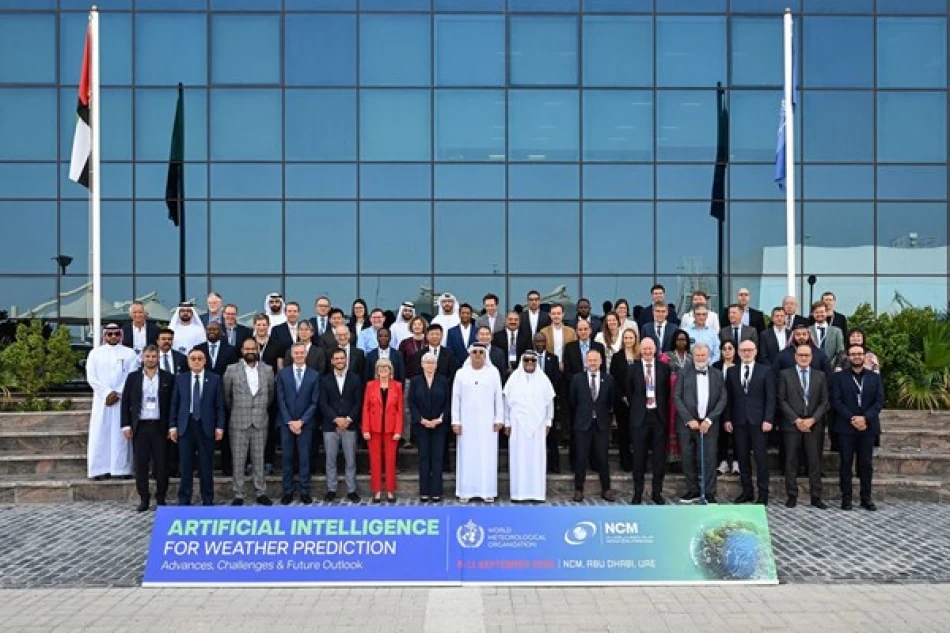
Abu Dhabi Hosts AI Weather Forecasting Conference: Unlocking the Power of Artificial Intelligence
UAE Positions Itself as Global Hub for AI-Powered Weather Forecasting Revolution
The UAE's National Center of Meteorology is hosting a landmark international conference in Abu Dhabi that signals the country's ambition to lead the integration of artificial intelligence in weather prediction. With backing from the World Meteorological Organization and participation from tech giants Microsoft, Google, NVIDIA, and IBM, the September 9-11 summit represents a strategic pivot toward AI-driven meteorological services that could reshape how nations prepare for climate challenges.
Tech Giants Rally Around Weather Intelligence
The conference brings together over 50 international speakers across 12 main sessions, creating an unprecedented convergence of meteorological expertise and cutting-edge technology. The participation of major tech companies alongside the European Centre for Medium-Range Weather Forecasts and various academic institutions underscores the growing commercial importance of weather prediction accuracy.
This collaboration reflects a broader trend where traditional weather services are evolving into data-intensive operations requiring significant computational power and machine learning capabilities—areas where tech giants hold competitive advantages.
Strategic Focus on Developing Nations
The conference's emphasis on serving developing countries reveals a calculated approach to market expansion and diplomatic influence. By positioning AI-enhanced weather forecasting as accessible to emerging economies, the UAE and its partners are addressing a critical gap where climate vulnerability often exceeds technological capacity.
The Business Case for Inclusive Weather Services
Developing nations face disproportionate risks from extreme weather events, yet often lack sophisticated forecasting infrastructure. AI-powered systems that can operate with limited ground-based data—relying instead on satellite imagery and IoT sensors—offer a pathway to democratize advanced weather prediction capabilities.
Data Infrastructure as the New Battleground
Conference sessions highlighted the critical role of diverse, high-quality datasets spanning ground observations, satellite imagery, IoT devices, and geospatial information. This focus on data infrastructure reveals where the real competitive advantages will emerge in AI-powered meteorology.
The discussions around data quality, interoperability, and accessibility suggest that success in this field will depend not just on algorithmic sophistication, but on the ability to aggregate and process vast streams of environmental data in real-time.
Trust and Transparency Challenges
A significant portion of the conference addressed fundamental questions about AI reliability in life-critical applications. As machine learning models become central to weather prediction systems that influence everything from agricultural decisions to disaster preparedness, ensuring these tools operate correctly becomes paramount.
Public-Private Sector Tensions
Discussions revealed inherent tensions between public sector meteorological agencies and private tech companies regarding transparency, data sharing, and innovation approaches. These differences in incentives and regulatory frameworks could significantly impact how AI weather prediction technologies are developed and deployed globally.
The conference sessions emphasized the continued importance of human expertise in validating AI-generated forecasts, suggesting that the future of meteorology lies not in full automation but in sophisticated human-AI collaboration.
Market Implications and Future Outlook
The UAE's hosting of this WMO-backed conference positions the country as a potential gateway for AI weather technology deployment across the Middle East and Africa. This aligns with the nation's broader strategy of becoming a regional hub for emerging technologies and climate adaptation solutions.
For investors and technology companies, the conference signals growing institutional support for AI meteorology applications, potentially accelerating commercial adoption and creating new market opportunities in climate-sensitive sectors including agriculture, energy, and logistics.
The convergence of meteorological expertise, AI capabilities, and international development priorities suggests that weather prediction is evolving from a public service into a strategic technology sector with significant geopolitical and economic implications.
Most Viewed News

 Layla Al Mansoori
Layla Al Mansoori






